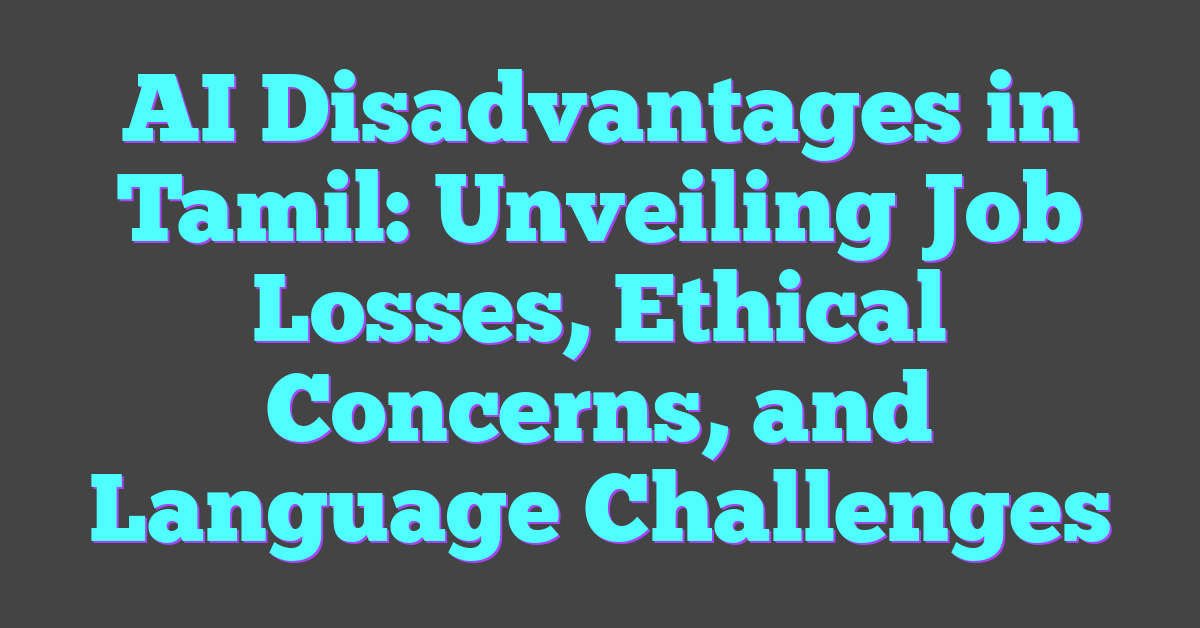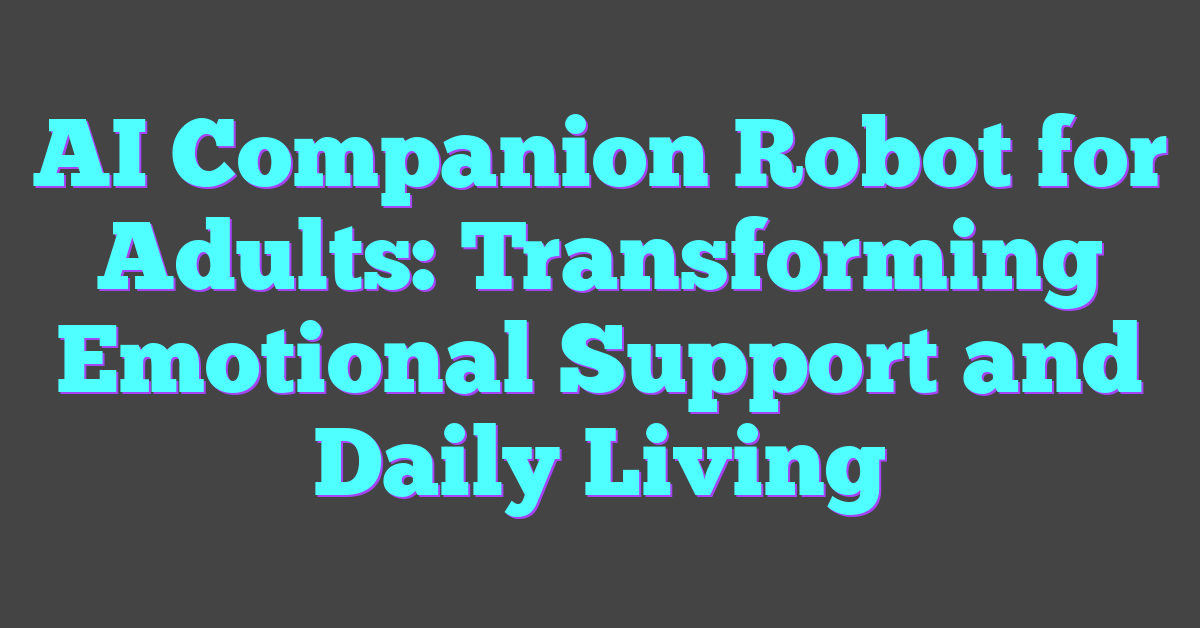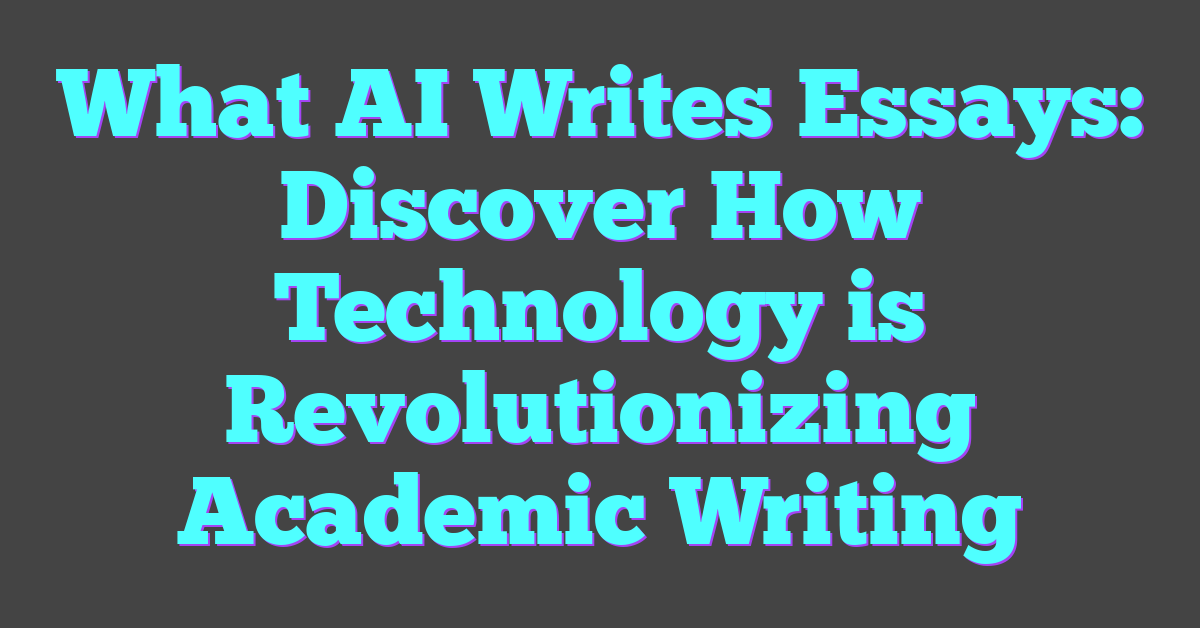Artificial Intelligence (AI) has taken the world by storm, transforming industries and daily lives. While it’s often celebrated for its benefits, it’s crucial to explore the flip side, especially in specific cultural contexts like Tamil Nadu. Understanding AI’s disadvantages in Tamil communities can help in making informed decisions about its adoption and use.
From job displacement to ethical concerns, AI’s impact isn’t always positive. In Tamil Nadu, where traditional industries and cultural values hold significant importance, the drawbacks of AI can be particularly pronounced. Let’s delve into some of these disadvantages to better grasp the complexities involved.
Understanding AI Disadvantages in Tamil Language Processing
Exploring the disadvantages of AI in processing the Tamil language reveals unique challenges. These disadvantages impact both users and developers, necessitating tailored approaches.

Challenges in Understanding Diverse Dialects
AI struggles with the diversity of Tamil dialects. Tamil Nadu has over 20 distinct dialects, each with phonetic variations and unique vocabularies. An AI model trained on one dialect might not accurately process another. For example, the Coimbatore dialect differs significantly from the Madurai dialect, making it difficult for a single AI system to handle both effectively.
Limitations in Processing Literal and Contextual Meanings
AI faces limitations in grasping both literal and contextual meanings in Tamil. Unlike some languages, Tamil relies heavily on context to convey meaning. Translating phrases or sentences can be challenging for AI due to context-sensitive nuances. For instance, the word “செம்ம” (semma) can mean “great” or “intense,” depending on context, which often confuses AI models not trained to differentiate such subtleties.
These challenges underscore the need for advanced AI models and improved data strategies in Tamil language processing.
Technical Barriers in Tamil AI Development
AI development in Tamil faces significant technical challenges that hinder its progress. These barriers need careful consideration to create effective AI models tailored for the Tamil language.
Lack of Comprehensive Datasets
Comprehensive datasets are vital for training AI models. Tamil AI struggles due to a scarcity of large, diverse datasets. Many available datasets lack the variety and depth needed to capture the nuances of the Tamil language. For example, there are limited sources containing different dialects, colloquial expressions, and context-specific usages. This results in AI systems that fail to comprehend or accurately process Tamil text, reducing their effectiveness and reliability.
Issues with Script Recognition and Font Inconsistencies
Script recognition in Tamil AI challenges development due to complex characters and varying fonts. Tamil script contains numerous characters and unique orthographic rules, making it harder for AI to recognize and process text uniformly. Additionally, font inconsistencies across various digital sources add another layer of complexity. For instance, different websites and digital content providers use different font encodings, leading to misinterpretations and errors in text recognition. Consequently, these issues impede the development of accurate and functional Tamil AI applications.
Cultural Implications of AI in Tamil Nadu
Impact on Local Employment
AI’s expansion in Tamil Nadu significantly affects local employment. Automation often replaces manual tasks in industries like textiles and agriculture. These sectors traditionally employ a large workforce, leading to job displacement. For example, automated machinery in textile mills reduces the need for human operators. Workers face challenges when seeking new employment, especially if they lack digital skills.
Businesses adopting AI also require fewer support staff. Customer service roles, often filled by local employees, are automated through chatbots and virtual assistants. Essential customer-facing jobs diminish, impacting local economies.
Risks of Cultural Misrepresentation
AI systems processing Tamil language risk cultural misrepresentation. These systems, developed with global data sets, often misunderstand local nuances. For example, dialect variations in Tamil complicate accurate language processing. AI models might misinterpret phrases unique to regions like Chennai or Madurai, leading to communication errors.
Cultural elements embedded in Tamil literature and media pose another challenge. AI struggles with metaphorical and contextual meanings specific to Tamil culture, such as traditional stories or proverbs. Misrepresentation affects content creators, as AI-generated translations and summaries may lack authenticity.
Ethical Concerns
Ethical issues regarding AI in Tamil Nadu are crucial and multifaceted. Addressing these concerns ensures responsible and fair application of AI technologies.
Bias in AI Algorithms
Bias in AI algorithms manifests due to skewed data sets. If training data lacks diversity, it reflects limited perspectives and perpetuates existing inequalities. This is problematic in Tamil Nadu, where dialects and cultural nuances vary significantly.
For example:
- Voice recognition systems might not recognize regional accents, favoring certain dialects over others.
- Recommendation algorithms may overlook local content, promoting globally dominant media over Tamil-specific cultural products.
To mitigate bias, developers can incorporate representative samples of diverse dialects and cultural content during the training phase.
Privacy and Data Security Issues
AI technologies often require large data sets, raising significant privacy and data security concerns. In Tamil Nadu:
- Personal information might be collected without explicit consent.
- Data breaches could expose sensitive information, leading to misuse or identity theft.
Implementing robust encryption techniques and strict data governance policies helps secure personal data. Additionally, involving clear consent mechanisms ensures user privacy.
Ethical deployment of AI in Tamil Nadu involves addressing biases in algorithms and maintaining stringent data security measures, respecting the region’s unique cultural and social context.
Conclusion
AI’s potential in Tamil Nadu is immense but it comes with significant challenges. Job displacement and ethical concerns can’t be ignored. Processing the Tamil language also poses unique difficulties. Addressing biases in AI algorithms and ensuring data security are crucial steps for responsible AI use. Tailored AI models can help meet these challenges effectively. By focusing on these areas Tamil Nadu can harness AI’s benefits while minimizing its drawbacks.
Frequently Asked Questions
What are the key challenges of AI in Tamil Nadu?
AI in Tamil Nadu faces challenges like job displacement, ethical concerns about bias in algorithms, and complexities in processing the Tamil language. Specific AI models need to be developed to tackle these challenges effectively.
How does AI impact jobs in Tamil Nadu?
AI can lead to job displacement by automating tasks traditionally performed by humans. However, it also creates new opportunities in technology development and maintenance.
What ethical concerns are associated with AI in Tamil Nadu?
Ethical concerns include biases in algorithms due to limited data diversity and potential privacy and data security risks. There’s a need for fair and responsible AI usage.
Why is processing the Tamil language complex for AI?
The Tamil language is complex due to its rich morphology and regional variations. AI models need to be tailored specifically to handle these linguistic aspects accurately.
How can biases in algorithms be addressed?
Biases in algorithms can be mitigated by using diverse datasets, ensuring representation, and regularly auditing AI systems to check for fairness and accuracy.
What measures are needed for data security in AI?
Stringent data security measures include encryption, access controls, regular audits, and compliance with data protection regulations to safeguard personal information.
Why is it important to tailor AI models for Tamil Nadu?
Tailored AI models can address the unique cultural and social context of Tamil Nadu, ensuring more effective and relevant applications of AI technologies in the region.
What are the potential privacy risks with AI technologies?
AI technologies can pose privacy risks by collecting and processing large amounts of personal data. Ensuring data protection through stringent security measures is crucial.
How can AI be applied responsibly in Tamil Nadu?
Responsible AI application involves addressing biases, ensuring transparency, protecting data privacy, and considering the cultural and social implications of AI technologies.




